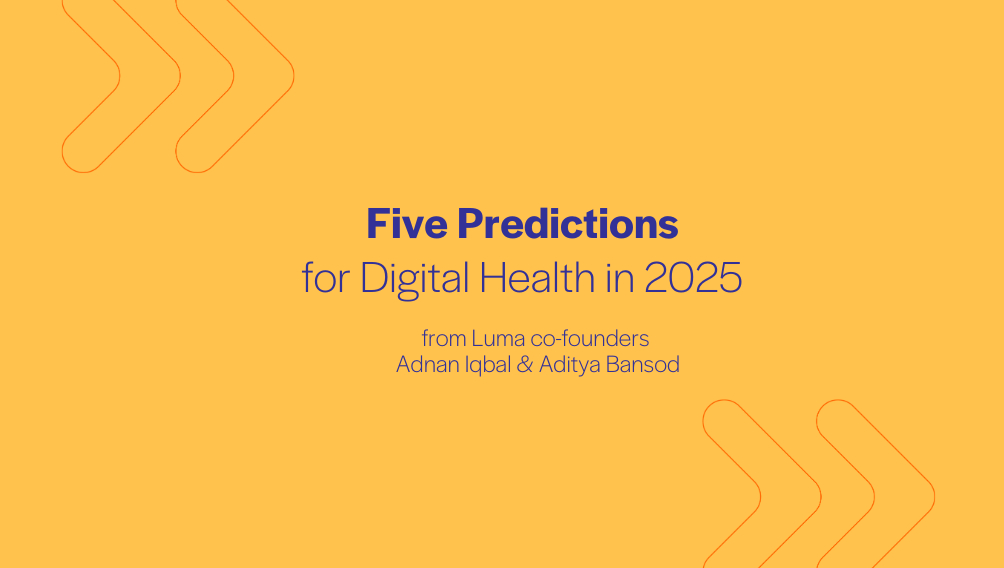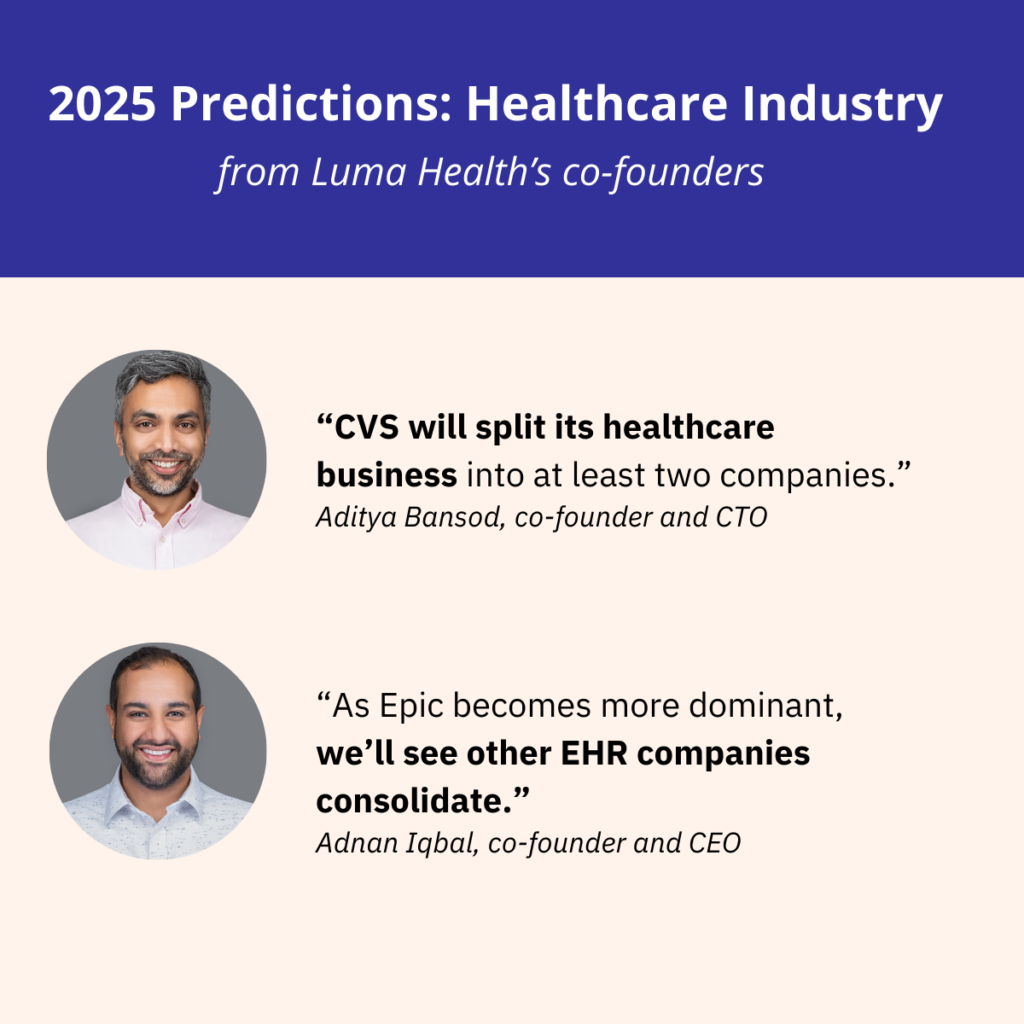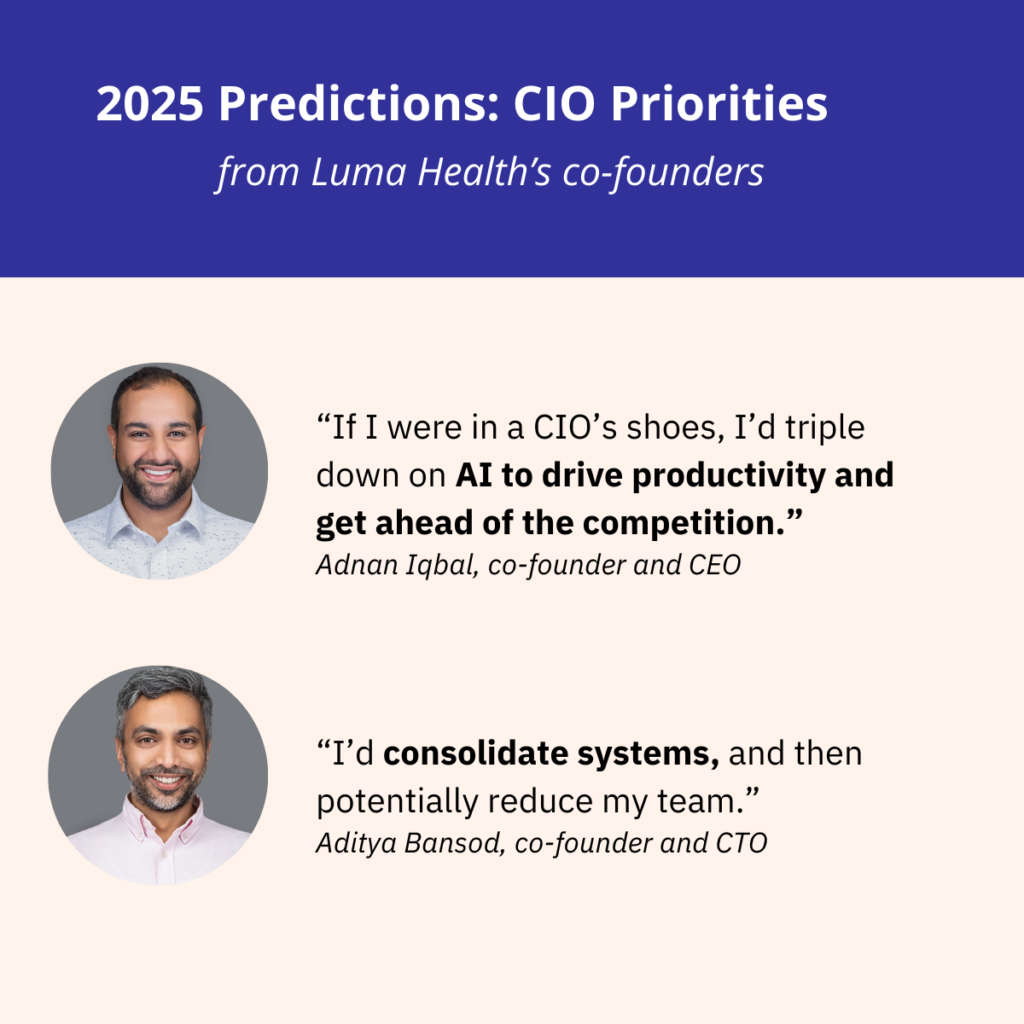Five Predictions for Digital Health in 2025

Luma’s co-founders Adnan Iqbal and Aditya Bansod discuss their predictions
As 2024 comes to a close, Luma’s co-founder and CEO Adnan Iqbal and co-founder and CTO Aditya Bansod sat down to share their perspectives on the past year and their predictions for 2025.
Many of the trends from 2025 will continue, they predict, including AI’s continued growth, industry consolidation, challenges for retail care, and focus on health system efficiency. Key changes Bansod and Iqbal predict include EHR mergers and a potential slowdown of interoperability regulation under the second Trump administration.
Their five predictions for 2025:
- CVS will split its healthcare business into consumer and payer segments.
- EHRs will merge to combat competition from Epic.
- CIOs will consolidate systems and use AI to drive efficiency.
- AI use will continue to grow.
- The incoming Trump administration could slow the pace of interoperability regulation.
A lightly edited transcript of their conversation follows.
—
Moving and shaking: Consolidation is in, retail care will face more changes
Key predictions: CVS will split up its healthcare business, EHRs will merge to combat competition from Epic
[Adnan Iqbal] Hello, end of 2024. Let’s talk first about what surprised us this past year. In hindsight, I’d say nothing was surprising.
[Aditya Bansod] Your clairvoyance is unmatched.
[AI] But, realistically, what was surprising was the sheer number of companies in health IT who looked to be acquired, raise money, or enter partnerships – and then stalled out. And less surprising this year was consolidations.
[AB] Stuff has just been changing hands. We’ve seen health systems trading hospitals to each other, just reshuffling.
[AI] That’s a great analogy. It’s the same cards in the deck. We’ve seen the same thing on the payer side this year. And watching Walmart Health shut down was a huge piece in the Jenga tower for retail health. Walgreens is out, CVS is on the table.
[AB] The consumer piece of healthcare is harder to get right than these retailers think. And until they get the consumer experience right, I think it’s gonna be a lot of capital burn without a lot of outcome. I think we’ll see the CVS healthcare business split into at least two companies, the consumer side and the payer side.
[AI] This prediction is pretty unsurprising, but I think we’ll see a lot more consolidation on the electronic health record front, too. In a world where Epic is more dominant, it’ll force others to consolidate, and carve out their parts of the market in 2025.

All-in on efficiency: For CIOs, maximizing resources will continue to drive strategy
Key predictions: CIOs will consolidate systems, use AI to drive efficiency, and potentially reduce team size – all enabling downstream investment in the consumer experience
[AB] Let’s talk about priorities for the CIO. If I were a CIO, the number-one priority on my list for 2025 would be to consolidate my systems. If I’m wearing a CIO’s shoes, I’m likely to be paying a lot for a big suite of tools that have proliferated within my health system over the last decade or so. I need to make sure I’m utilizing everything to the fullest capacity or getting rid of it.
[AI] I’d agree with that. First, I’ll note that every single CIO puts security at the top of their list. But in addition, if I have a CIO’s shoes on, I have to triple down on embracing AI to drive workflow productivity. Because if I do that, I will be ahead of my competition. My health system is well-positioned compared to other nearby systems. We can then focus on differentiating ourselves in an increasingly competitive environment, and making sure we stand out compared to our peers not just for the quality of care, but for the consumer experience.
[AB] Maybe a spicier take, but if I’m no longer wasting money on software, on maintaining and integrating it, then I can reduce the size of my team. And returning economics to the business would then allow the health system to grow and compete on consumer experience.
[AI] That is spicy, it’s provocative, but for all the right reasons. Very on-brand for you.
AI boom: No surprises here – the boom will continue
Key prediction: AI will continue to grow to increase productivity and clinician satisfaction
[AI] AI in 2025 – boom or bust? I think we’d both say boom.
[AB] Definitely boom – the boom won’t stop. We’re just at the tip of the iceberg. Across healthcare, but also life sciences.
[AI] It’s about the way we work. Healthcare is not immune to workers needing to be effective and productive and have meaning and value in their work. Especially for increasingly in-demand clinical care team members, if you can help them be more productive and be more satisfied, everyone wins.

Policy changes: Incoming Trump administration’s effect on regulation
Key prediction: The policy impact of a new administration is uncertain, but it could slow down the pace of interoperability after 2024’s progress
[AB] It’ll be really interesting to see what the regulatory world looks like, especially regarding data exchange. A lot of the changes we’ve seen in 2024 with TEFCA and Qualified Health Information Networks™ (QHINs™), and potential TEFCA exchange via FHIR, was mediated by the Biden administration.With the upcoming Trump administration, we know that rule-making was understood to be slowed down. So the progress we’ve made with preventing information blocking, with information sharing, do we continue the pace?
We hear from safety net and regional hospitals that without good interoperability, their business dies because patients are seen elsewhere, but they need to continue to provide ongoing care to those patients. Level one critical care, maybe they don’t provide that, but they need to know about it.
Anti-predictions for 2025
What’s unlikely to change in 2025
[AI] Alright, what are some anti-predictions or things we’ll laugh at when 2025 ends?
[AB] I’d like to hear your take on PBMs.
[AI] Well, I think PBMs have a lot of money and lobbying power, and they spend it wisely. And I think this incoming administration will be focused elsewhere.
[AB] My prediction that I’ll laugh at is that I think we should have QR codes for our insurance cards. I use my Apple Wallet when I’m boarding the plane, but I still get issued these flimsy little insurance cards. A QR code insurance card makes all the sense in the world. But it’s a pipe dream – not happening in 2025.
—
For more discussion of changes in healthcare, innovations in digital health, and how health systems and leaders are delivering care to their communities, subscribe to Digital Health: On Air.
